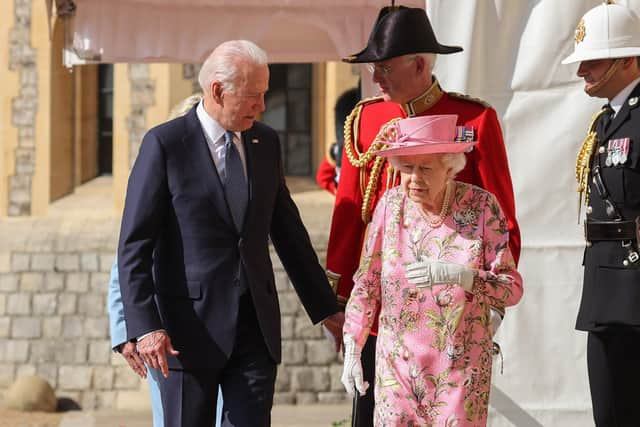Queen Elizabeth II played a historic role in fostering the special relationship with the US – Henry McLeish
Remembrance of the Queen has occasioned a remarkable out-pouring of grief in the United States with wall-to-wall coverage by the media, sincere comments and tributes from politicians and a great deal of respect and affection from ordinary Americans.
A blizzard of comments swept the country, such as “the Queen’s entire life was a duty fulfilled”; “we are fascinated by the monarchy, but we loved the queen”’ “the Queen’s death underscored continuity in an age of disjunctions”; and the “Queen’s reign embodied an endangered principle: unity”.
Advertisement
Hide AdAdvertisement
Hide AdWell-known commentator Fareed Zakaria said the Queen was “the most disciplined leader of the past century”, adding that “as oversharing and ideology take primacy, America could use more of Elizabeth’s institutionalist dignity”.
In a curious way, the Queen struck a chord with millions of Americans as the head of state they wanted but could never have, in a country constantly at war with itself.
There is no unity of purpose or anyone exercising soft power in the pursuit of the national interest against factional interests. While Americans were in awe of the pageantry, traditions and history of the British monarchy, Queen Elizabeth II was regarded as exceptional, a unifying force beyond politics.
Not every broadcaster in the US shared this uncritical praise and MSNBC, a left-leaning TV channel, has been exceptionally critical. Extensive commentary of the Queen’s death included views such as, “the long-term future of the monarchy remains an open question. The royal family derives its power from upholding tradition and resisting modern life. Trying to make the monarchy modern is futile.”


In a similar vein, Ishaan Tharoor, writing in the Washington Post, said: “The days to come will see a surfeit of commentary and analysis of the depth of that legacy. But one narrative is inescapable. Elizabeth ascended the throne 70 years ago as the head of a global-spanning empire but died at a moment of contraction and uncertainty with Britain’s colonies gone, its place in Europe a source of tension and its global status diminished.” Colonialism and history still clearly rancour.
In contrast, Eugene Robinson, writing in the Washington Post said: “Britain’s Queen Elizabeth was the last of her kind. There will never be another monarch quite like her, not in Britain, not anywhere in the world. Elizabeth Windsor died Thursday as she had lived throughout her long life – stoically, dutifully, regally. She made her share of mistakes, but managed to recover and learn from them.”
The early beginnings of the much-talked-about special relationship between the US and the UK stretches back to the 13 colonies of America between 1607 and 1776, the Revolutionary wars between 1775 and 1783, and to the Declaration of Independence in 1776.
Heading up the loss of the colonies was King George III, the great, great, great, great-grandfather of Queen Elizabeth II. King George III is famously remembered for two reasons, losing America, and losing his mind, officially in 1810 with a regent taking over in 1811.
Advertisement
Hide AdAdvertisement
Hide AdThe extent and impact of British influence was considerable, even at the time of the Declaration of Independence.
The fledgling country struggled to even decide what they should call their new leader, George Washington. When the founding fathers were writing the Constitution in the 1780s, they had no idea what to call their executive officer.
For a variety of obvious reasons, they rejected King. Once George Washington was elected to fill the role, the new Congress had to focus on what to call him. President seemed “too plain” so they “brainstormed a bunch of ideas”, some of which seemed very British, including elective majesty, sacred majesty, elective highness, illustrious highness, and serene highness, according to National Public Radio in the US.
The Senate went on record as recommending “His Highness, President of the United States and Protector of their Liberties”. But “fear of an elective king” captures why the US did not want any reminders of their colonial past and Congress eventually settled on President.
Attitudes to the old country eased over the next two centuries, and Queen Elizabeth II was the first British monarch to address a joint meeting of Congress in May 1991, receiving a standing ovation.
Notwithstanding the fact that Joe Biden might have been addressed today as his Serene Highness, rather than President, his remarks about the Queen have been heart-felt and reflective of modern America.
“She defined an era,” the President said, “a figure who was much more than a monarch.” She was, he said, a “steadying presence in a changing world and she led with grace, an unwavering commitment to duty, a stateswoman of unmatched dignity and constancy who deepened the bedrock alliance between the United Kingdom and the United States”.
But, at a time of such eloquent tributes, there are also seemingly inevitable attempts to cast a darker side to the story. An article in an online news outlet in the US was headlined: “Revealed, How Biden’s Irish Catholic mom who allegedly hated the English told him not to bow to the Queen or kiss her ring when he met her while working as a senator in 1982.” Queen Elizabeth II herself was sensitive to the history of Ireland and paid an historic visit in 2011 – the first British monarch to make an official state visit to Ireland in 100 years.
Advertisement
Hide AdAdvertisement
Hide AdBut I will let Joe Biden have the final word: “She stood in solidarity with the United States during our darkest days after 9/11 when she poignantly reminded us that grief is the price we pay for love.”
America now stands in solidarity with her.
Henry McLeish is a former First Minister of Scotland and ex-leader of the Labour Party
Comments
Want to join the conversation? Please or to comment on this article.
